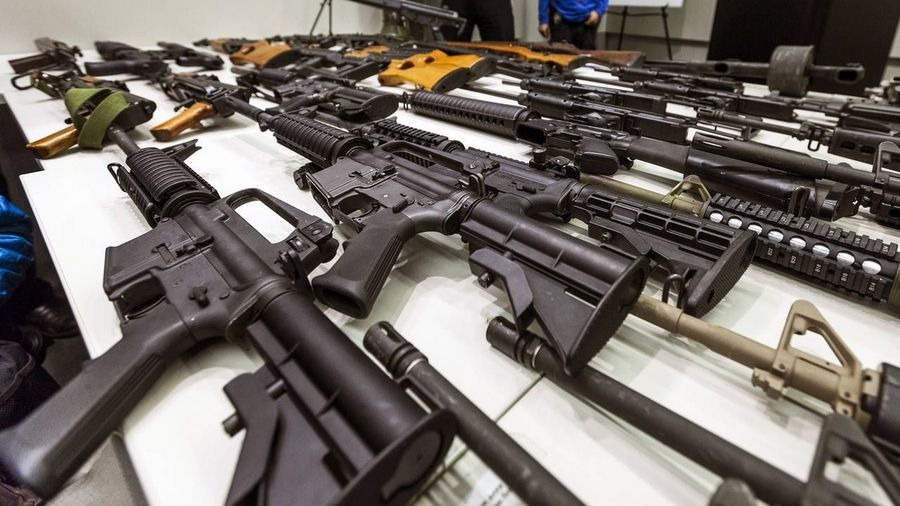Federal judge puts president’s revised travel ban on hold
Mar 15, 2017, 3:41 PM | Updated: 4:23 pm
Update: A federal judge in Hawaii has put President Donald Trump’s revised travel ban on hold.
U.S. District Judge Derrick Watson issued his ruling Wednesday after hearing arguments on Hawaii’s request for a temporary restraining order involving the ban.
His ruling prevents the executive order from going into effect Thursday.
Original story
Washington state filed an emergency motion on Wednesday for a temporary restraining order against President Donald Trump’s impending executive order that would bar travelers from six Muslim-majority countries. This new, backup motion is another effort to stop Trump’s revised travel ban.
Trump’s new travel ban – with an administration goal to keep would-be terrorists out of the U.S. while the government reviews the vetting system for refugees and visa applicants – is scheduled to go into effect on Thursday.
With the clock ticking, Washington argued in its emergency motion against Trump and members of his administration that the state faces imminent harm.
On Wednesday afternoon, a judge in Hawaii put the revised federal travel ban on hold, the Associated Press reports.
The Trump administration’s new travel ban aims to withstand court challenges that halted the initial travel ban, an effort also led by Ferguson and granted by a federal judge in Seattle. Ferguson said the new order is still unconstitutional and harms residents, universities and businesses, especially tech companies such as Washington state-based Microsoft and Amazon who rely on foreign workers.
Here’s a quick breakdown of the case:
• The president’s revised travel order leaves Iraq off the list of banned countries but still affects would-be visitors and immigrants from Iran, Syria, Somalia, Sudan, Yemen and Libya.
• The first travel ban included travelers from Iran; chaos unfolded at airports as people were detained.
• Ferguson’s lawsuit on the first travel and asked a court to declare key provisions of the executive order unconstitutional and illegal.
• Federal judge James Robart in Seattle halted the ban nationwide by granting a temporary restraining order in February after Ferguson filed a lawsuit.
• Arguments from the Washington State Attorney General’s Office and the Department of Justice ensued, but the 9th U.S. Circuit Court of Appeals upheld Robart’s ruling to keep the travel ban blocked.
• After the 9th Circuit decision, the Trump announced that his administration would roll out a new executive order on immigration.
• The president signed the new order on Monday; it is scheduled to go into effect on March. 16.
• Hawaii was the first state to file a lawsuit against Trump’s revised travel ban, saying the order will harm its Muslim population, tourism and foreign students.
• Now more than a half-dozen states are trying to derail the executive order.
• Ferguson filed documents in federal court last week. Ferguson wanted Robart to confirm that his restraining order remains against the initial travel ban remains in place against the new travel ban.
• On Wednesday, Washington state filed a backup motion to stop Trump’s revised travel ban.
• Also on Wednesday, Judge Robart questioned a lawyer for the Northwest Immigrant Rights Project.
What does the new order include?
Trump officials say that even with the changes, the goal of the new order hasn’t changed: keeping would-be terrorists out of the United States while the government reviews the vetting system for refugees and visa applicants from certain parts of the world.
The new version tries to erase the notion that it was designed to target Muslims by detailing more of a national security rationale. It is narrower and eases some concerns about violating the due process rights of travelers.
The revised order is narrower and specifies that a 90-day ban on people from Sudan, Syria, Iran, Libya, Somalia and Yemen does not apply to those who already have valid visas. The White House dropped Iraq from the list of targeted countries following pressure from the Pentagon and State Department, which noted Iraq’s role in fighting the Islamic State group.
According to a fact sheet from the Trump administration, the Department of Homeland Security will conduct a country-by-country review of the information the six targeted nations provide to the U.S. for visa and immigration decisions. Those countries will then have 50 days to comply with U.S. government requests to update or improve that information.
Why is the Washington state attorney general taking action?
Days after Trump’s signing on of the new order, Ferguson said that his team is not filing a new lawsuit, but they will file a motion before the federal court in Seattle. That motion will ask Judge Robart to extend his temporary restraining order against the first ban to Trump’s revised order.
Ferguson filed an amended complaint on Monday. An emergency, backup motion was filed on Wednesday afternoon.
In the new court filing, Ferguson said the state supports the arguments made in a related case filed by an immigrant rights group based in Seattle that alleges the ban discriminates against Muslims and violates federal immigration law. Ferguson said the judge should consider Washington state’s new emergency motion for a temporary restraining order if he doesn’t see fit to issue an order in the case by the rights group or to rule immediately on a prior motion by Washington state.
What was discussed in a Seattle courtroom on Wednesday?
Judge Robart began the session Wednesday by questioning a lawyer for the Northwest Immigrant Rights Project about two seemingly conflicting federal laws on immigration.
One gives the president the authority to keep any class of aliens out of the country, and another forbids the government from discriminating on the basis of nationality when it comes to issuing visas.
Attorney Matt Adams responded that while the law does give the president broad authority, Congress later clarified the law to say the government can’t discriminate on the basis of nationality any more than it could bar people based on their race.
Ferguson, his office’s solicitor general Noah Purcell, were in the courtroom observing.
The Justice Department says Trump’s action is a lawful exercise of presidential authority.
Does the president have the authority?
The administration says the travel ban is about national security. The revised order specifies that people from the listed countries “warrant additional scrutiny in connection with our immigration policies because the conditions in these countries present heightened threats.”
But intelligence analysts at the Department of Homeland Security have questioned that rationale, concluding that citizenship is an “unlikely indicator” of terrorist ties.
In addition, the states and civil liberties groups say U.S. immigration law generally prohibits the government from discriminating based on nationality when issuing immigrant visas. The president cannot rewrite that law by executive order, the states say.
Are states right to sue?
Some legal scholars have questioned whether states have standing to bring their cases, citing limits the Supreme Court has placed on when states can sue the federal government.
Michael McConnell, a constitutional law professor at Stanford Law School, has said he is “highly skeptical” that states can sue over this issue.
The 9th Circuit panel found that Washington and Minnesota, which is part of the original lawsuit, did have standing, at least at that early stage. The judges noted that some people would not enroll in universities or join the faculty, causing real harm for the states.
Hawaii, a state also suing against the travel ban, focuses on an additional aspect: the loss of tourism, and thus tax dollars, in the heavily travel-dependent state.
“I don’t think standing’s a serious problem,” said Rory Little, a former Supreme Court clerk who teaches at the University of California Hastings College of the Law. “There’s clearly harm to state budgets, harm to state universities.”
Why does the Trump administration believe we need this order?
Attorney General Jeff Sessions that national security is the driving force behind the ban and pointed to the cases of 300 people he said entered the United States as refugees who are now being investigated by the FBI as part of terrorism-related cases. He provided no details.
A senior Justice Department official earlier in the day cited the same statistic to reporters in a background call. The official refused repeated requests to provide any details about those cases, including the nationalities of the 300, or to say how long they have been in the United States.
The new order does not address concerns raised in a Homeland Security intelligence analysis obtained last month by The Associated Press that concluded there was insufficient evidence that citizens of the originally banned countries posed a terror threat to the U.S. The administration has played down the significance of that report.
The Associated Press contributed to this story.













